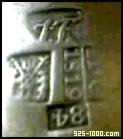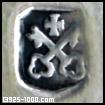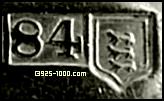Online Encyclopedia of Silver Marks, Hallmarks & Makers' Marks
| |||||||
| |||||||
|---|---|---|---|---|---|---|---|
| |||||||
| ||||||
|---|---|---|---|---|---|---|
 c.1840s-c.1870s   c.1870s   c.1880-c.1890 |
(Кострома) A quartered shield with a small cross to its upper left and a crescent moon to its lower right was used throughout most of the 19th century. A sailing ship or galera was used in the latter 19th century. The sailing ship was also used in an arched top cartouche from 1769-1813.  Kostroma Arms |
 Vasily Savelyev (silversmith) В. Савельев Ivan Volkov (assayer) Иван Волков Kostroma 1849  unidentified silversmith Ivan Volkov assayer) Иван Волков Kostroma 1853  Nikolay Chulkov (silversmith) Николай Чулков assayer (not applicable) Kostroma c.1885 | ||||
 1847 
 1861  c.1891 |
(Минск) Located in Belarus. The double headed imperial eagle with crown, used from the mid 19th century. This mark is often confused with those of Warsaw or Kamenetz-Podolsk. Unfortunately, Postnikova-Loseva has listed a great number of Warsaw assayers and makers in her Minsk section. As from 1891, a shield depicting three bars wavy was also used as the Minsk town mark.  Minsk Oblast Arms |
 unidentified silversmith unidentified assayer Minsk 1847  unidentified silversmith Fyodor Bogomolov (assayer) Ф. Богомолов Minsk 1851  unidentified silversmith Egor Zaburdin (assayer) Егор Забурдин Minsk 1861 |
 |
(Нижний Новгород) As from the mid 18th century, the town mark depicts a stag in a shield. In the last quarter of the 19th century, the cartouche form changes to a rectangle with cut corners. Nizhny Novogrod's town mark is quite similar to one used by the town of Rostov (not shown).  Nizhny Novgorod Arms |

| |
 c.1800 
 1819 |
(Но́вгород) The double headed imperial eagle was first used. As from 1740, the town mark depicts two bears flanking a throne with crossed sceptre & cross with a three armed candelabrum above.  Novgorod Arms |
 unidentified silversmith Nikita Safronov (assayer) Никита Сафронов Novgorod 1819 | |
 1847   1853 |
(Новочерка́сск) The double headed imperial halved above diagonal quarters with crossed spears & scepters, flags, and castle.  Novocherkassk Arms |
 unidentified silversmith A. Inozemtsev (assayer) А. Иноземцев Novocherkassk 1847  unidentified silversmith unidentified assayer Novocherkassk 1853 |
 c.1850s  c.1870  c.1880  1889  1890 |
(Одесса) Located in Ukraine. The first version of the town mark is a grapnel anchor topped by the double headed imperial eagle halved, this symbol is from the Odessa city arms and was used from the mid 19th century until c.1887. As from 1888, the city mark was changed to an orthodox cross surrounded by three crowns with rays emanating from the cross's top juncture. This symbol is drawn from the arms of the Kherson (Херсон) Province within which Odessa was located at the time. The choice of this symbol has led to some confusion about this later Odessa town mark. Postnikova-Loseva #3781 illustrates a late 19th century dvoinik mark containing this symbol as for the city of Kherson, however, Kherson city did not ever have an assay office. Postnikova-Loseva #3858 illustrates the mark shown at bottom left as an unidentifed town.
|
 Zhozef Galyano (silversmith) ????? ??????? Karl Sack (assayer) Карл Сак Odessa 1853  unidentified silversmith unidentified assayer Odessa 1870  unidentified silversmith unidentified assayer Odessa 1879  unidentified silversmith Iosif Shmidetsky (assayer) Iосиф Шмидецкий Odessa 1890  G. Tsitrin (silversmith) ?. ?????? Iosif Shmidetsky (assayer) Iосиф Шмидецкий Odessa 1889 |
 18th/19th C.   1840s-1890s |
(Рига) Located in Latvia. The crossed keys were used throughout the 18th century and until c.1843 when replaced by a depiction of twin fortress towers flanking the city's crowned crossed key symbol.  Riga Arms |
 unidentified silversmith Ludvig Zuck (assayer) Лудвиг Зук Riga 1868  unidentified silversmith Ludvig Zuck (assayer) Лудвиг Зук Riga 18??  unidentified silversmith Ivan Spiridonov (assayer) И. Спиридонов Riga 1891 | |
 1845   1851 |
(Саратов) The three fishes were used from the mid-18th century  Saratov Arms |
 Aleksey Utkin (silversmith) Алексей Уткин Kapiton Sidorov (assayer) Капитон Сидоров Saratov 1845  unidentified silversmith Kapiton Sidorov (assayer) Капитон Сидоров Saratov 1851 | |
 1858   1859   1884 |
(Таллин) Located in Estonia. A shield of three lions passant in use as from 1842, previous mark was a plain cross within a rectangle or shield.  Tallinn Arms |
 Leopold Michelsen (maker) Л. Михельсен Jakov Natarov (assayer) Яков Натаров Tallin 1858  Leopold Michelsen (maker) Л. Михельсен Jakov Natarov (assayer) Яков Натаров Tallin 1859  Leopold Michelsen (maker) Л. Михельсен unidentified assayer Tallin 1884 |
| Sources:
Золотое и серебряное дело XV-ХХ вв - M.M. Postnikova-Loseva, Ivanova, Uljanova; Nauka, 1983 Russian Gold and Silver - Alexander von Solodkoff; Trefoil Books, 1981 Russian Silver - Andrei Gilodo; Beresta Moscow, 1993 Znaki srebra do lat 40. dwudziestego wieku w Polsce - Sławomir Bołdok; Mako Press, 2005 925-1000.com Silver Marks Forum - various member posts, 2005-2013 |
Looking to do further research? Have a mark you can't identify? Join the forum.

| © 2000-2018 925-1000.com all rights reserved |






